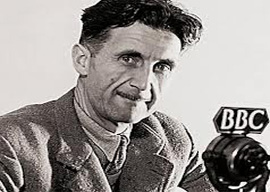
August 26, 2012

George Orwell
In Nineteen Eighty-Four, Winston Smith works in the Ministry of Truth, the state propaganda department. He is eventually tortured in Room 101, which was a conference room at the BBC World Service where Orwell worked during World War II.
It is incredible how similar the state’s manipulation of thought and language in Nineteen Eighty-Four is to that imposed on our lives by today’s forces of political correctness.
His fictional state created “newspeak,” a deliberately impoverished language designed to diminish free and alternative thought which it has branded “thoughtcrime.” It also promoted “doublethink””the acceptance as correct of two mutually contradictory beliefs.
This reminds me of PC slogans such as “excellence for all” or “strength through diversity” or PC mindsets such as “Jews good, Israelis bad” or being against racial and sexual discrimination but in favor of workplace quotas for blacks and women.
It also reminds me of television coverage of the so-called Arab Spring which has been nearly all so nauseatingly in favor of the rebels, regardless of how fanatically theocratic and antidemocratic they are and regardless of the perilous consequences of unseating what are more or less pro-Western dictators. How can these reporters be in favor of both the rebels and democracy at the same time?
In modern Italy the ex-communists and their toxic derivatives who infest nearly all media outlets often brand me a fascist simply because I write stuff that irritates them. Unlike them, I am not a fascist because I believe in freedom and the free market.
Undoubtedly, I would have preferred to live in fascist Italy rather than Soviet Russia until Mussolini’s fall in 1943. What normal person wouldn”t? I just want to be free to get on with my life.
In many respects, Orwell was deeply conservative. He loved England (as distinct from Britain) and English traditions, English food and beer, the English language, and England’s love of liberty. He was patriotic and did not like left-wing pacifism. He was deeply suspicious of an all-powerful state”even a socialist one”that destroyed liberty in the name of liberty. He would have rigorously opposed today’s state-health fascism.
And unlike nearly everyone else on the left, he was refreshingly honest about fascism’s mass appeal.
In a review of Mein Kampf for the New English Weekly published in March 1940 well after World War II started, Orwell wrote that despite Hitler’s excesses, he found “something deeply appealing about him.”
So if the BBC is so dead keen to avoid the charge of left-wing bias, a statue of Orwell outside its new London headquarters would be a step in the right direction.